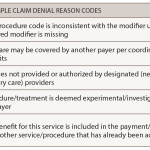Denials management and appeals are the two most underestimated processes in rheumatology offices. Most practices lose thousands of dollars every year because they are not following up or writing off denied claims correctly.
To boost their revenue cycles, physicians and their staff must stay on top of denials. The following quick tips will help you prepare your practice for a revenue boost:
- Make sure that the patient’s identification number and name are correct, because this is the number-one denial for the Centers for Medicare & Medicaid Services (CMS). Neither insurance companies nor CMS will correct the number for you;
- Make sure that your claims are re-filed in a timely manner;
- Make sure that all denial codes are resolved before resubmitting a claim; and
- Know your private carriers’ contracts and your CMS carrier’s local coverage determination (LCD).
To begin the process, a practice should review the insurance contract or CMS carrier’s LCD and determine if the denial was appropriate. Occasionally, the denial does not provide enough information. At these times, a phone call to the carrier is the first step toward resolving the denial.
In some cases, there is only one way to handle a denial—appeal the decision. Each private carrier has its own rules and guidelines on how to appeal a claim. A practice should keep in mind that time is an important factor when trying to appeal a claim. Office staff should pay close attention to the time limit when appealing a claim with private payers; the deadline for filing an appeal could range from 30 days to one year.
CMS has explicit rules regarding appeals. The five levels in the CMS appeal process are:
- Redetermination by a Medicare carrier: Practices have 120 days from receipt of the initial claim determination to file an appeal. There is no minimum dollar amount for this appeal level. CMS typically comes to a resolution within 60 days of receiving all supporting documentation for a request.
- Reconsideration: Reconsideration is performed by a qualified independent contractor (QIC), which is made up of an independent panel of physicians and other healthcare professionals. A written reconsideration must be filed within 180 days of receiving the redetermination. A decision is typically made within 60 days. If the QIC cannot come to a decision within 60 days, the practice can then take the appeal process to the next level.
- Hearing before an administrative law judge (ALJ): The dispute must be over $120. Most ALJ hearings are done by phone or by video-teleconference. If an in-person hearing is requested, the practice must show good cause for a hearing. The ALJ will typically issue a decision within 90 days of the hearing request. Practices may also ask the ALJ to make a decision without a hearing.
- Request an appeals council review: If the practice is not satisfied with the ALJ decision, it can request an appeals council review. There are no money prerequisites for this level, but the request must be submitted in writing within 60 days of receipt of the ALJ’s decision. A decision will typically be made by the appeals council review within 90 days.
- Judicial review in the U.S. District Court: To file for a hearing in the U.S. District Court, the claim issue must be for at least $1,180, and the request must be made within 60 days of the appeals council decision.
Not understanding the guidelines can cost a practice money. If practices successfully keep their denials and appeals under control, they can keep revenue where it belongs—in the office.
If you find that your denials management and appeals processes are not being handled correctly by the insurance companies or CMS, contact the ACR’s Coding and Reimbursement Specialist, Melesia Tillman, CCP, CPC, at (404) 633-3777, ext. 820, or visit www.rheumatology.org.
